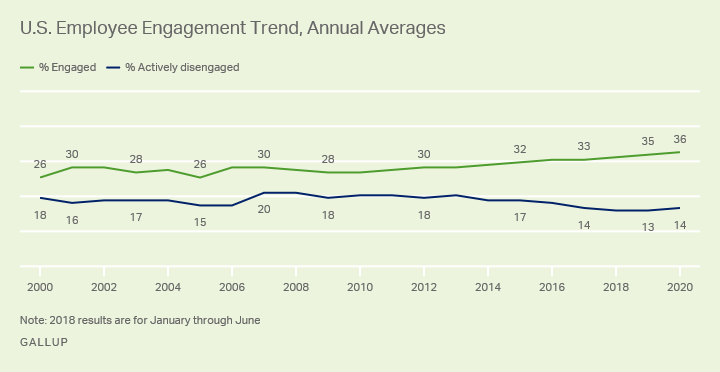With seven out of every ten workers in America emotionally disconnected from their job, there’s a high likelihood you may not be in the right job for you. But then, what is the “right” job for you?
Here are five questions to consider.
Since 2000, the Gallup Business Journal has been keeping track of what it calls “employee engagement.” Here are the findings as of the end of 2020:

Engaged employees stand at 36%; this means employees work with passion, feel connected to their company, and drive innovation in the workplace.
Meanwhile, actively disengaged employees account for 14% of the workforce. These aren’t folks who just feel ambivalent towards their jobs; they act out their dissatisfaction and undermine the accomplishments of their peers.
That leaves 50% of employees who fall in the middle, checked out of their work and coasting through for a paycheck.
That’s scary! 64% of today’s workforce basically feel no personal stake in their jobs. They’re just marking time.
What accounts for that? I believe it’s because most people are in jobs that don’t fit them very well. Either the people hiring them are getting it wrong, or the people themselves are getting it wrong, or both. All the statistics on hiring point in that direction:
• Brad Smartt, a hiring expert and the originator of the Topgrading hiring system, suggests that two-thirds of all hires are inadequate.
• CareerBuilder did a study this year showing that 66 percent of employers have been affected by a bad hire in the last year.
• Nearly two-thirds of CEOs in the United States fail to achieve the objectives for which they were hired, and are replaced within four years. Forty percent leave after 18 months (Stoddard and Wyckoff, The Right Leader).
And this has been going on for decades. In the middle of the last century, Peter Drucker noted that the track record for hiring executives was so dismal that one could do at least as well by flipping a coin.
Five Signs You’re In the “Right” Job
The “right” job for you is a job that pays you to make good use of your core strengths and natural motivation. In other words, a job that matches your giftedness.
If you can answer yes to these five questions, you’re in a good job-fit:
(1) Do you gain energy and enthusiasm from doing your job?People who are in the right job wake up excited to go to work. They throw themselves into the task, because their heart is in it. They may even wake up in the middle of the night when their mind suddenly comes up with the answer to some work-related “problem.” Their work is like breathing to them.
(2) Do you see results from your efforts?People who are truly gifted to the task tend to see results from their labors that they regard as important and/or significant. They feel like they’re “”getting somewhere,” and that their work “matters.” It’s important to them, and they’re seeing consistent productivity. They’re not just wasting time.
(3) Do you receive affirmation for what you accomplish?Granted, getting affirmation and praise from others is somewhat outside of your control. But people do notice good work, and they tend to point it out. So if you’re in a good job-fit, you’ll tend to do good work, and as a result you’ll receive various kinds of feedback that others regard your work as good and adding value. Maybe you’ll hear an “attaboy,” or get a raise, or receive an award, or just get a personal word from your boss. Of course, some people require no recognition for their efforts. But whether you need it or not, you’ll know whether you’re fulfilling the expectations of your job if other people are praising your work.
(4) Are you getting better at what you do? People develop within their strengths, not their weaknesses. So if you’re in a good job-fit, you’ll instinctively develop your proficiency over time. You’ll also be looking for ways to add to your knowledge and skill-level. And you’ll take pride in doing the job well, and want to do it better and better.
(5) Does your job bring you satisfaction?Perhaps the primary hallmark that you are using your giftedness is deep satisfaction and joy. When was the last time you said/felt, “It was worth going to work today. I can’t wait to go back tomorrow.” If it was today, you’re in a great job-fit. If it’s been years—pay attention! Because you’re not in the right job.
A Word to the Skeptics
Many people think what I’m describing here is either a luxury reserved for just a fortunate few, or an impossibility altogether. Neither is true.
Just look back at the statistics from Gallup. Yes, 70 percent of people are disengaged from their work. But 30 percent are engaged. Thirty percent do feel a personal sense of connection to their jobs, and they’re putting their hearts into their work. So that disproves both the idea that it’s impossible to find the “right” job, or that only a few find it.
Given the facts, the sensible thing to do if you’re not in a good job-fit is to study the 30 percent who are and ask: how did they do that, and what can I learn from their experience that would help me get into the right job?
There’s no question that some people luck into the right job. But most people don’t. As the statistics show, most people actually “luck” into the wrong job.
Is there any way to remove luck from the equation and replace it with intentionality? Yes. The more you know about your giftedness, the better you’ll be able to go on a targeted search to find a job that fits that giftedness.
Unfortunately, most people have no clue as to what their giftedness is—their core strengths and natural motivation. I say that on the basis of having devoted almost two decades to helping individuals discover their giftedness. Again, the numbers and the other statistics would seem to confirm my assertion.
What were you born to do?
Giftedness boils down to the question: what were you born to do? I’m not talking about what you “can” do or “like” to do. I’m talking about your essential personhood and what you cannot not do.
Imagine a tool that doesn’t know what it was designed to do. . .

Lacking insight about its fundamental purpose, that tool is liable to go around breaking windows, putting dents in cars, smashing thumbs, or worst of all, trying to drive screws. Talk about a mis-fit! In the end, totally defeated, about the only meaningful work a tool like that will be able to find is to be a doorstop. What a waste of talent!
But now, suppose someone helps that tool understand that s/he was designed to drive nails? Suddenly the prospects for meaningful work enlarge dramatically—because there are so many nails in the world. From then on, that tool won’t be looking for a job, it will be looking for a nail.

The same is true for every creature. Everything was made for a purpose. Cows were made to produce milk. Eagles were made to soar. Dogs were made to wag their tails and lick faces. Pigs were made for barbecue (and pig races).
And people? Well, every person is uniquely designed to do something, and that something is wrapped up in their giftedness. Figure out what their giftedness is and you now have deep insight into what they were born to do. Then find some spot in the workplace that values that special talent (i.e., pays for it), and bingo!, you’ve found the right job for them!
Oh, sure, there are lots of things that factor into making work enjoyable: the right boss, likable coworkers, organizational culture, economic vitality, government policies, where the job is located, the weather, etc. Pay is also a consideration.
But here’s the cold, hard reality: you can have all those tangential things absolutely perfect—even the paycheck. Nonetheless, if the job fundamentally doesn’t match a person’s giftedness, it won’t engage that individual. It won’t fit them. Their heart won’t be in it. They’ll still be among the 70 percent. They’re liable to be a highly paid doorstop, carrying out a job, but not even beginning to tap their real horsepower.
Question: Can you describe someone who is obviously in the “right” job for them? How did that come about?


Customer Reviews
Thanks for submitting your comment!